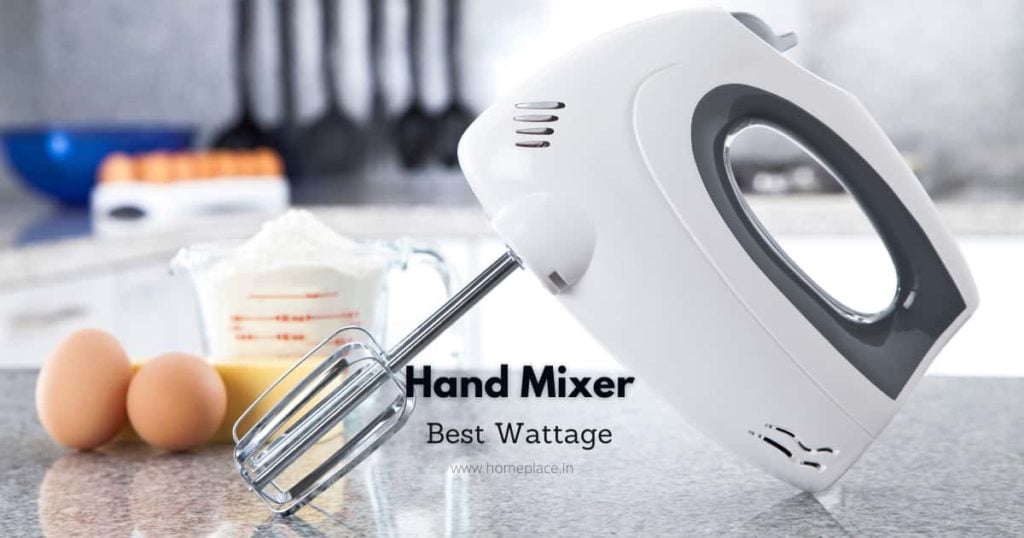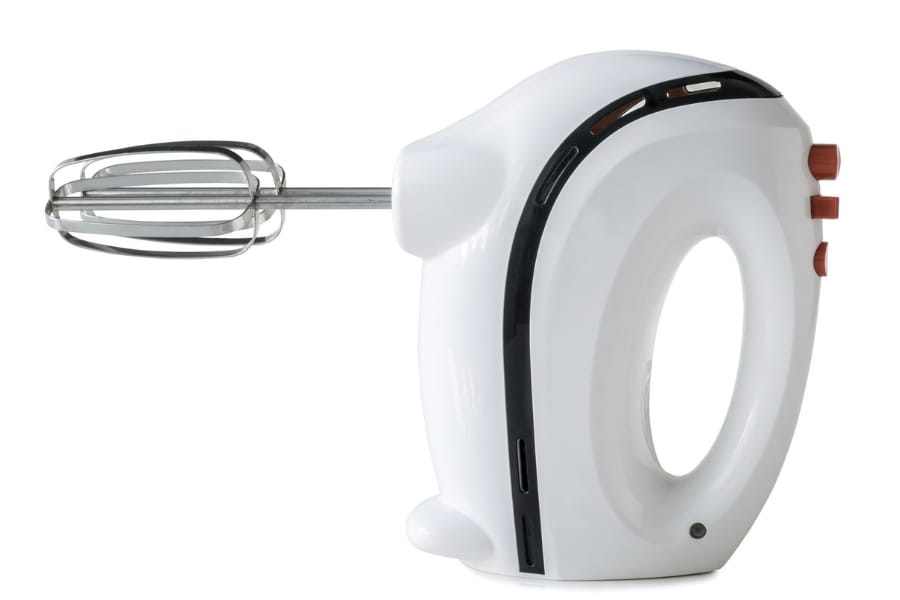Hand mixers or electric beaters have always been one of the most important kitchen appliances ever, at least if you’re not a coffee lover. The simple yet repetitive beating, stirring, and whisking used to be one of the most laborious tasks to do in cooking. Thanks to technology, the tasks are automated with the help of mixers, especially hand mixers.
One can argue that standing mixers deserve a higher position than hand mixers, but that’s not true. Hand mixers are versatile and powerful; the speed is higher and can be easily maneuvered around the bowl for better stirring or beating.
However, while buying a hand mixer, you need to take special care of the fact they come in different wattages. The wattage of a hand mixer greatly affects its performance and power consumption. So, choosing the best wattage for a hand mixer is crucial. Let’s see how you can get yourself an ideal-wattage hand mixer without hurting your electricity bill.

Range Of Wattage For Hand Mixers
Various hand mixers from different brands come with different wattages that affect a hand mixer’s overall performance. Unlike stand mixers, hand mixers come with wattage as low as 150 watts. It may be useful for normal, less dense mixtures like eggs. It will fail to beat when the density of the mixture gets higher.
So, you have to choose according to your needs. You don’t need a 700-800 watt hand mixer unless you’re a professional running or working in a bakery. For normal use in the home, 350 watts is considered ideal.
However, the wattage of hand mixers ranges from 150 watts to 350 watts. With some exceptions reaching 700 watts and above. You can easily get a cheaper hand mixer of 150 watts, or you can put some extra bucks and get yourself a 300-watt electric beater to get more effective results.
However, there is always a tradeoff between power consumption and the performance of a hand mixer.
There is no way you can achieve one without compromising the other, or can you?
We’ll discuss that in the latter part of this article.
How Is Power Consumption Affected By Wattage Of Hand Mixers?
Typically, a hand mixer’s working is the precise movement of various small parts, including beaters, housing, and the motor compartment. The motor makes the beaters rotate in opposite directions. One rotates clockwise and the other anticlockwise.
This motor compartment is the main component in the beater responsible for power consumption. An increase in wattage increases the power of motors which results in fast movement of the beaters. Take special note that an increase in wattage also increases the hand mixer’s tendency to heat up to extreme levels if used consistently.
The power consumption of a hand mixer is a function of the wattage of a hand mixer. A hand mixer with higher wattage draws more power but completes the work faster reducing the run time.
As Power Consumption= Wattage x Run Time
If you choose a 200 watt setting on your hand mixer, which may mix the batter of dosa in 5 minutes, it will consume the power of-
(200×5)/(1000×60) kW-hour
or, 0.0167 kW-hour or electricity units
Running this process twice a week will consume only 0.13 units of power a month.
If the electricity rate in your area is ₹6/unit, it will cost you less than one rupee.
It’s always recommended to carefully choose the wattage of the hand mixer according to your needs. It would help if you also kept the beaters’ speed on the lower side to save more energy.

How Much Wattage Is best For A Hand Mixer?
It’s important to invest in a trusty hand mixer of a trusted brand with the right wattage.
What is the right wattage?
If you use the mixer for regular purposes, the cost can be of considerable amount, for which choose a wattage that can make the process faster, saving you precious time. For this reason, always choose a hand mixer with at least 150 watts of capacity, which is also the cheapest option. If you use the mixer machine frequently, higher power up to 300 watts is the best wattage for hand mixers suitable for your home use.
In most cases, increasing the wattage directly affects the performance and the overall power consumption. However, the exponential rise of technology has allowed some brands to make their electric beaters extremely efficient using high-quality parts.
The use of such parts allows low-wattage hand mixers to outperform ones with a high wattage. Having a low wattage doesn’t necessarily mean the mixer will perform poorly. If the parts are of very good quality, they’ll require less wattage to operate at high performance.
Tips to choose a suitable Power rating of hand mixer
You may not consider a hand mixer the most power-sucking appliance at your home, but when there’s a chance of saving some energy, why not do it?
Choosing the right wattage for your electric hand mixer can help you with that. After all, a hand mixer is one of the most frequently used appliances in your kitchen.
When choosing the best hand mixer in India, you have a lot of brands and thus a lot of options. It’s not an easy task to choose the best one for you. You can have to get to know your needs and frequently you’re going to use the hand mixer. If you occasionally use a hand mixer, then a high-wattage electric beater won’t you a significant amount of money.
However, if you plan to use it daily, you need to get a lower wattage from a reputable brand. Ranging from a tiny 100 watts to a whopping 750 watts, hundreds of options are available in hand mixers. A 250-300 watts mixer is considered ideal in most cases.
There’s also this misconception that increasing the wattage will increase the performance of the hand mixer. No, that’s not always true. The wattage of a hand mixer is the input power, i.e., how much power goes into the mixer. Not how much comes out of it. So, an efficient lower wattage mixer can easily outperform an inefficient high wattage hand mixer.
Choosing the best wattage for hand mixers is not just based on numbers, there’s a lot more to it.
Related Post:
- Best Wattage for Induction Cooktop
- Best Wattage for Hair Dryer
- Electric Beater Vs Blender
- Bester Attachments for Hand Mixers
- Comparison of Hand Blender and Hand Mixer
